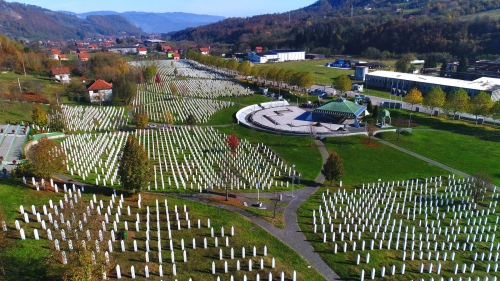Qadhafi: Regional Power Broker?
Libyan President Muammar Qadhafi has had a busy schedule in recent months playing host to numerous African and Arab leaders. This flurry of activity has produced criticism from the United States especially with regards to visits to Libya by U.S. allies such as Eritrea and Egypt. But despite U.S. attempts at continuing Libya's isolation, regional leaders, and even European nations such as Britain and France, have rushed to consolidate ties with a country that seems to be striving to become a regional powerbroker.
In recent months Qadhafi has hosted high-level talks with leaders from some of the hottest trouble spots in Africa. Qadhafi has been instrumental in progress achieved in situations such as the Eritrean-Ethiopian conflict, the Sudanese civil war, the Democratic Republic of Congo (DRC) and Great Lake regional feud, the Sierra Leone crisis and the conflict in Liberia. He has also held talks with Egypt's Hosni Mubarak, Palestine's Yasser Arafat, Algeria's Abdelaziz Bouteflika, Gambia's Yahya Jammeh, South Africa's Nelson Mandela, and controversial American and Nation of Islam leader Louis Farrakan. And his efforts were instrumental in achieving a cease-fire in the DRC and as well progressing towards reconciliation between Eritrea and Sudan.
Several entities traditionally committed to ensuring peace in Africa have formally commended Qadhafi's efforts. France, which for many years has been the major broker in Africa, has lauded Qadhafi's role. On April 22, the United Nations Security Council recognized "the initiative of Colonel Muammar Qadhafi in contributing towards a lasting solution of the conflict in the DRC." And Organization of African Unity (OAU) Chairman Blaise Compaore (current president of Burkina Faso) on May 29 publicly extolled the Libyan president's efforts to bring comprehensive peace to the African continent.
With a recent easing of U.N. sanctions against Libya for its turning over of the Lockerbie airplane bombing suspects, the United States stands alone in continued efforts to isolate Libya. In 1997, U.S. President Bill Clinton renewed former President Reagan's 1986 Executive Order 12543. In part, it declared a national emergency to "deal with the unusual and extraordinary threat to the national security and foreign policy of the United States constituted by the actions and policies of the government of Libya." Those concerns have persisted as is evidenced by a 1999 U.S. State Department report that once again lists Libya as a state sponsor of world terrorism, along with Iran, Cuba, Iraq, North Korea, Sudan and Syria. On May 27 of this year, the U.S. Congress passed a measure urging Clinton to keep the sanctions on Libya and to exert diplomatic pressure in order to maintain U.N. sanctions.
But the U.S. stance seems increasingly less important to other world powers. Britain, France, Italy and Germany all have recently negotiated lucrative industrial and/or oil deals with Libya. And South Africa has renewed economic ties with Libya.
Despite U.S. criticism over his friendship with Qadhafi, Nelson Mandela has praised Libya's role in supporting the anti-apartheid struggle and according to one Agence France Presse report, has said of his relationship with Qadhafi: "Those who feel we should have no relations with Qadhafi have no morals. Those who feel irritated by our friendship with President Qadhafi can go and jump in the pool."
The Arab League has taken a strong stance against U.S. policy towards Libya. The League's Assistant Secretary General Muhammad Zakariya Ismail said the U.S. stance causes mistrust among the Arab states and that it "places the USA in a bad situation before the world," as quoted by ArabicNews.com.
It is evident that Qadhafi is the center of an intense controversy. On the one hand, he remains, for the United States, one of the world's primary sponsors of world terrorism. On the other hand, Qadhafi represents a rallying point for African and Arab unity. But Libya's 30-year ruler is perhaps not exactly a shining example of democracy and human rights in action. A 1996 Amnesty International report concluded, "In Libya gross human rights violations are taking place not only with total impunity but also are sanctioned by the highest level." But despite such criticisms, Qadhafi seems to have nonetheless become an inspiration for the concept of regional solutions for regional problems.
The Libyan president has strong pan-Arab and pan-African political leanings that surface quite regularly. Qadhafi wishes to revive the Arab Maghreb Union with North African countries. He has recently tried to better his relations with Arab states such as Saudi Arabia and at a June 1 meeting there he called for an Arab bloc that would rise above individual sovereignty issues. In a December 1997 interview with the Nation of Islam's Final Call, Qadhafi called for a new policy of Arab-African unity. In that interview by writer Askia Muhammad, Qadhafi said, "Arabs and the Africans are a people who are connected to each other more than any other people. Half of Africa is Arab. Half of Africa is Muslim...we should be united to determine our common self-determination, and to face this common enemy together, united."
It remains to be seen whether Muammar Qadhafi's newfound role as regional unifier and peace-maker will produce lasting effects in the current divided and war-plagued state of affairs in African and Arab countries. It is also unclear as to whether Qadhafi will be able to shake the controversies of the past and take active steps to become a more functioning member of the world community. But in his regional efforts, he certainly has emerged as one of the foremost spokespersons for unity in the face of Western domination. It is a stance that has earned him the undying enmity of the United States, but which has sparked progress in regions where progress of any kind is most needed.
Zakariya Wright is a staff writer at iviews.com
Topics: Bill Clinton, Conflicts And War, Foreign Policy, Nelson Mandela, United States Of America
Views: 1389
Related Suggestions

















